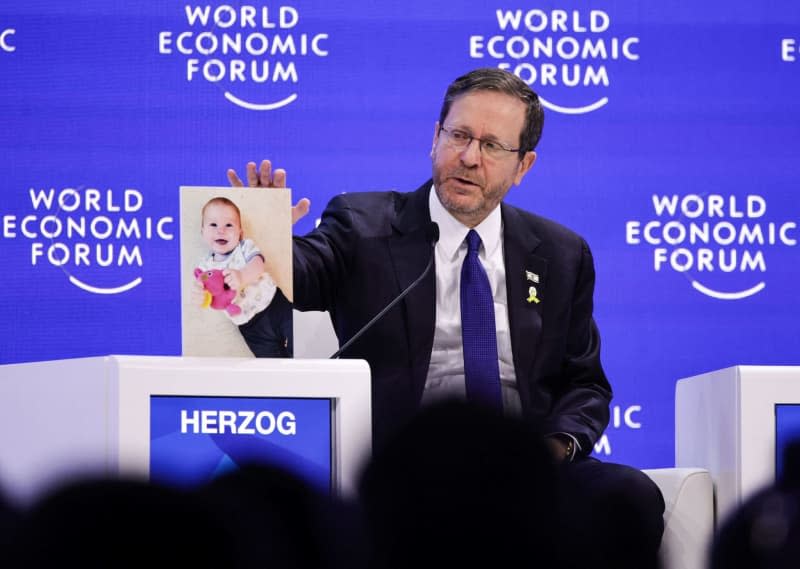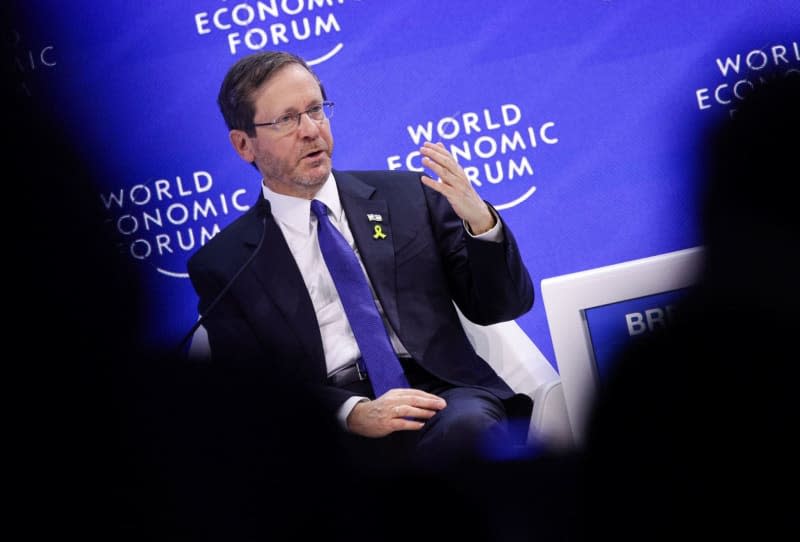Israel's leaders cool on Palestinian state as war drags on

- Oops!Something went wrong.Please try again later.
- Oops!Something went wrong.Please try again later.
Israel's leaders appeared to pour cold water on hopes for a Palestinian state any time soon as the war in Gaza dragged on.
President Isaac Herzog said at the World Economic Forum (WEF) in the Swiss ski resort of Davos on Thursday that Israel must work hard to find new ways for dialogue with the Palestinians.
"Israelis lost trust in the peace processes because they could see that terror is glorified by our neighbours," Herzog said.
In his opinion, countries calling for a two-state solution must first clarify the question of how Israel's security can be guaranteed.
Israelis and Palestinians must be offered a better future. "People want to live together and they want to live in peace."
A two-state solution has been sought since the mid-1970s and is internationally recognized as the formula that could bring peace to the Middle East conflict.
The signing of the Oslo Peace Accords in 1993 raised high hopes, and the Palestinian Authority was founded a year later on the basis of these agreements.
The Palestinian Islamist Hamas movement has been torpedoing the peace process ever since with bloody attacks on Israelis. However, the United Nations also sees the Israeli settlements in the West Bank as a major obstacle to a peace settlement.
Israeli Prime Minister Benjamin Netanyahu said on Thursday that any solution in the foreseeable future must include Israel's military control over the entire West Bank.
This contradicts the idea of the sovereignty of a Palestinian state, Netanyahu said at a press conference on Thursday. "What are you supposed to do?" he said when asked whether the United States was planning a scenario for the "time after Netanyahu" that envisages the creation of a Palestinian state.
In talks with US representatives, he said, he had fended off attempts to dictate a reality that would harm Israel's security. "Israel's prime minister must be able to say 'no' when necessary, even to our best friends," Netanyahu continued.
"From every area from which we withdraw, we get terror, terrible terror," said the right-wing politician, adding that this had happened in southern Lebanon, in the Gaza Strip and in parts of the West Bank. That is why control of the West Bank is so important, he said.
On the ground, the Israel Defense Forces (IDF) said on Thursday that their soldiers had killed some 60 militants during battles in the Gaza Strip in the past 24 hours, with 40 killed in the southern city of Khan Younis alone.
Israel aims to eliminate the leadership of the Islamist Hamas movement and suspects its fighters are hiding in the extensive network of tunnels beneath the city.
The focus of the military operation, which began in response to the October 7 Hamas terrorist attacks, is now on the southern part of the strip; the Israeli Defence Ministry said intensive combat operations against Hamas have ended in the north.
The information could not be independently verified.
Miltants from Hamas and other groups killed more than 1,200 people and took around 250 others hostage to the Gaza Strip on October 7. Since then, dozens of hostages have been released.
President Herzog said on Thursday there was little chance of talking about peace while hostages were still being held in Gaza: "In order to change the atmosphere, we need to get the hostages back."
Israel responded to the attack with massive airstrikes and a ground offensive in the Gaza Strip that has led to the deaths of more than 24,400 people and more than 61,000 injured, according to the Hamas-run health authority.
Israel is facing growing international criticism due to the soaring number of civilian casualties and dire humanitarian situation in Gaza.
Medicine sent by Qatar was delivered to the Gaza Strip through the Kerem Shalom border crossing on Thursday, an Egyptian Red Crescent official told dpa.
Some 60 tons of medicines and other medical goods were delivered to the strip after they were inspected by Israel at the crossing, he said.
The medicine is provided according to an agreement brokered by Qatar between Israel and Hamas, which stipulates the medicine to be distributed at a ratio of 1:1,000 to hostages and people in the besieged coastal strip, according to the Red Crescent official and the Qatari broadcaster Al Jazeera.
As part of the agreement, two planes carrying food and medicine from Qatar and France landed in the Egyptian coastal town of al-Arish on Wednesday.
The European Parliament, meanwhile, called for a permanent ceasefire in the Gaza conflict provided that all hostages are released and Hamas is dismantled.
The resolution noted that Israel has the right to defend itself within the limits of international law.
The plenary session called for a European initiative for a two-state solution. Resolutions passed by the EU Parliament are not legally binding.


